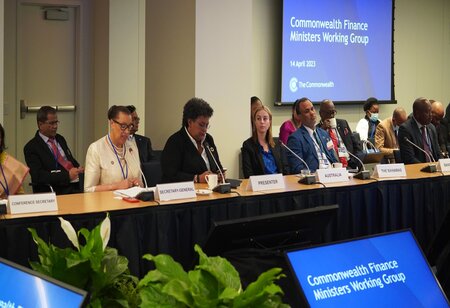India to Chair Finance Ministers Working Group for Commonwealth's Call for Reform of Global Financial Architecture
By Consultants Review Team
 During the Commonwealth Finance Ministers High-Level Working Group Meeting held in Washington D.C., finance ministers from several Commonwealth nations urged for systemic changes in the global financial architecture to enhance access to development financing for vulnerable countries. The ministers also decided to appoint India as the chair and Nigeria as the deputy chair of the Finance Ministers Working Group to promote reform of the global financial architecture.
During the Commonwealth Finance Ministers High-Level Working Group Meeting held in Washington D.C., finance ministers from several Commonwealth nations urged for systemic changes in the global financial architecture to enhance access to development financing for vulnerable countries. The ministers also decided to appoint India as the chair and Nigeria as the deputy chair of the Finance Ministers Working Group to promote reform of the global financial architecture.
The finance ministers had discussions on national fiscal policies, measures for financial sustainability, eligibility criteria for development finance, and possible reforms to create a more equitable financial architecture during the inaugural Commonwealth Finance Ministers High-Level Working Group Meeting held on the sidelines of the 2023 World Bank Group and International Monetary Fund (IMF) Spring Meetings.
During the Commonwealth Finance Ministers High-Level Working Group Meeting, the finance ministers emphasized that any reforms to the global financial architecture must enhance funding and take into account the needs of vulnerable countries when providing support to strengthen their resilience and attain sustainable development. Patricia Scotland KC, the Commonwealth Secretary-General, stated in her opening remarks that the world confronts several economic, security, and environmental challenges that are interconnected and exacerbate existing inequalities, potentially endangering stability, resilience, and development prospects.
The Commonwealth Secretary-General, Patricia Scotland KC, stressed the importance of ambitious, systemic reforms to address the challenges faced by the world. As a family representing a third of humanity, the Commonwealth is advocating for the restructuring of the global financial system to create a multi-dimensional, adaptable, and fit-for-purpose architecture. This architecture should aim to establish long-term resilience and achieve sustainable development. Scotland emphasized that vulnerable countries' realities must be taken into account when allocating support to developing countries to bring about meaningful change in the global financial system.
The Commonwealth Secretary-General, Patricia Scotland KC, pointed out that the Commonwealth's Universal Vulnerability Index can be used as a reliable tool to target support to the most vulnerable countries. Prime Minister of Barbados, Mia Mottley, delivering a keynote address at the working group meeting, emphasized the need for change in the current system. Mottley stated that the current discriminatory treatment between the global north and south is unsustainable, particularly in a poly-crisis. She urged immediate action to ensure that the global financial system is fit for purpose.
During the working group meeting, ministers highlighted the pressing need to address the global financial architecture, which is still based on fiscal rules and conditions that are not suitable to meet the challenges of the current global economic landscape. They discussed the eligibility criteria for accessing concessional finance, which is mainly based on the sole metric of Gross National Income (GNI) per capita, and does not fully consider the vulnerabilities of each country.
The current global economic landscape and overlapping crises have revealed that countries are vulnerable to external shocks, which exposes the limitations of traditional rules and conditions for accessing international development finance. The eligibility criteria for concessional finance based solely on Gross National Income (GNI) per capita does not adequately address national vulnerabilities. In response, the Commonwealth Secretariat has published a paper titled 'Fiscal Policy Options for Resilient and Sustainable Development,' which recognizes the multidimensional vulnerabilities and socio-economic challenges that countries face. The paper proposes several fiscal and policy reforms to facilitate more resilient and sustainable development outcomes.
During the meeting, Ruth Kattumuri, who is a Senior Director in the Commonwealth Secretariat's Economic, Youth, and Sustainable Development Directorate, emphasized the importance of collaboration among Commonwealth countries through the working group. She suggested that such collaboration could enable knowledge exchange, data sharing, research, and toolkits, including the use of Environmental, Social, and Governance (ESG) practices, to monitor and accelerate progress on sustainable investing, promote an environmentally responsible economy and society, and protect the planet.




